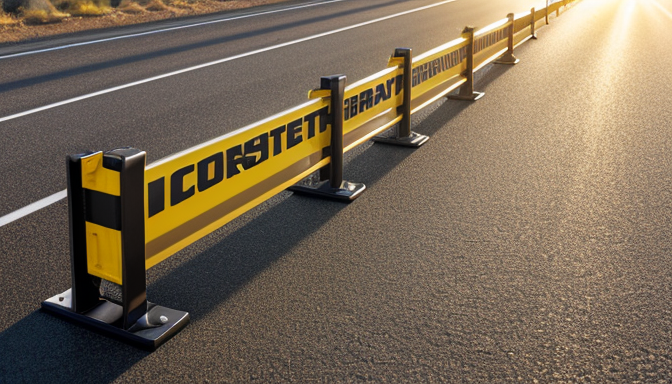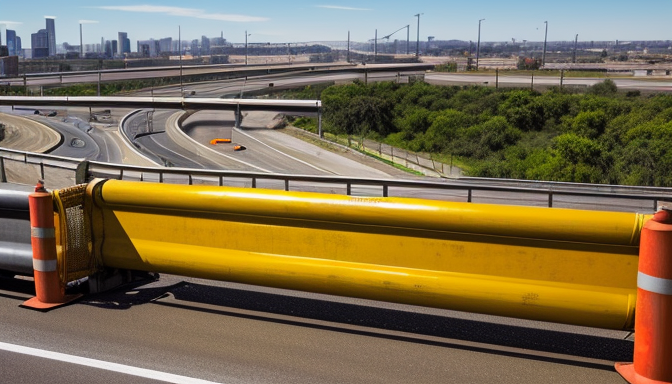Highway steel barriers are essential components of road safety. They act as protective shields, keeping vehicles from veering off the road and minimizing the impact of accidents. But what exactly makes these barriers so important? Let’s dive into the nitty-gritty of highway steel barriers.
First off, you might be wondering about their price. Understanding the cost factors associated with highway steel barriers is crucial for budgeting projects. The average price can vary significantly based on several factors, including:
- Material quality
- Design specifications
- Manufacturer reputation
- Transportation costs
By keeping these factors in mind, you can make informed decisions. Bulk purchasing often leads to substantial savings, so if you’re managing a large project, consider buying in bulk.
Next, let’s talk about weight. The weight of highway steel barriers is not just a number; it’s a significant factor in how they are transported and installed. On average, these barriers can weigh anywhere from 200 to 500 pounds each, depending on their design and material specifications. This weight impacts installation methods, as heavier barriers require more robust equipment and manpower to set up. Imagine trying to lift a heavy object without the right tools—it’s not just difficult; it can be dangerous!
Now, what about the properties of these barriers? They are designed with specific attributes to ensure safety and durability. For instance, the material strength is crucial. Highway steel barriers are typically made from high-strength steel, which provides excellent resistance to impacts. Additionally, they are often treated for corrosion resistance, ensuring that they withstand harsh weather conditions and last for years. It’s like having an umbrella that not only keeps you dry but also lasts through the toughest storms.
Finally, let’s discuss sizes. Highway steel barriers come in various sizes to cater to different road conditions and safety requirements. Standard dimensions are often dictated by regulatory standards, but customization options are available. This flexibility allows for adjustments based on specific needs. For instance, a narrow road may require smaller barriers, while a highway with heavy traffic might need more robust, wider barriers. Size truly matters when it comes to functionality and installation.
In summary, highway steel barriers are more than just metal structures. They are vital safety features that protect lives. By understanding their price, weight, properties, and sizes, you can make better decisions for your projects. Whether you’re a contractor, a safety officer, or just someone interested in road safety, knowing these aspects can make a significant difference.
Highway Steel Barrier Price
Understanding the cost factors associated with highway steel barriers is crucial for budgeting projects. Prices can vary widely based on several elements. For instance, the type of steel used, the manufacturing process, and even the supplier can all impact the final cost. On average, you might find prices ranging from $50 to $200 per linear foot. But why such a big range? Well, it boils down to quality and specifications.
When considering the price, it’s essential to think about the long-term benefits of investing in high-quality barriers. Cheaper options may save you money upfront, but they could cost more in repairs and replacements down the line. It’s like buying a pair of shoes: a cheap pair might hurt your feet, while a more expensive, well-made pair lasts for years.
Also, don’t forget about bulk purchasing. If you’re overseeing a large project, buying in bulk can lead to significant savings. Many suppliers offer discounts for larger orders, which can help stretch your budget further. For example, ordering 500 feet might reduce your cost to $40 per foot, compared to buying just 50 feet. That’s a smart move!
Another factor to consider is the location. Transportation costs can add up quickly, especially if you’re sourcing barriers from far away. Local suppliers may charge a bit more, but they could save you on shipping and handling. It’s worth weighing the pros and cons.
In summary, while the price of highway steel barriers can seem daunting, understanding the various factors at play can help you make an informed decision. Remember, investing in quality now can save you headaches and expenses later. So, before you dive into purchasing, take a moment to evaluate your options and consider the long-term impact.

Highway Steel Barrier Weight
The weight of highway steel barriers is more than just a number; it’s a crucial factor that affects transportation, installation, and overall safety. When you think about it, these barriers are designed to withstand the impact of vehicles, which means they need to be heavy enough to do their job effectively. But how heavy are they, really? And what does that mean for your project?
On average, a standard highway steel barrier weighs between 1,000 to 1,500 pounds per section. This weight can vary based on several factors, including the design and the materials used. For example, some barriers are made from high-strength steel, which can be lighter yet still offer the same level of protection. It’s like choosing between a sturdy backpack and a suitcase; both can carry your stuff, but one is easier to handle.
When planning for installation, it’s important to consider how this weight impacts your logistics. Heavier barriers require more robust equipment for transportation and installation. If you’re working on a project that involves a lot of these barriers, you might need to think about:
- **Transport vehicles**: Do you have the right trucks to carry these heavy loads?
- **Installation crew**: Are your workers trained to handle the weight safely?
- **Site preparation**: Is the installation site ready for heavy machinery?
Moreover, the weight of these barriers can affect the timeline of your project. If the barriers are too heavy for your current equipment, you might face delays. It’s like trying to move a big rock without the right tools; you’ll spend more time and effort than necessary. So, always factor in the weight when budgeting and planning.
In addition to logistics, the weight also plays a role in the barrier’s performance. Heavier barriers tend to absorb more impact, which can be a lifesaver in a crash situation. This is why understanding the specifications of the barriers you’re considering is essential. Here’s a simple table to illustrate the average weights of different types of highway steel barriers:
| Barrier Type | Average Weight (lbs) |
|---|---|
| Standard Steel Barrier | 1,200 |
| High-Strength Steel Barrier | 1,000 |
| Reinforced Concrete Barrier | 1,500 |
In conclusion, the weight of highway steel barriers is a critical consideration in any road safety project. It influences not just the cost but also the logistics and safety of installation. Always do your homework on the specifications and plan accordingly. After all, a well-planned project is a successful project!
Highway Steel Barrier Properties
Highway steel barriers are not just metal rods stuck in the ground. They are engineered systems designed to protect lives and property. Their properties play a crucial role in ensuring they perform effectively in various environments. Let’s dive into what makes these barriers tick.
First off, one of the most critical properties is material strength. These barriers are made from high-quality steel, which means they can withstand significant impacts. Imagine a car colliding at high speed. A robust steel barrier absorbs that energy, preventing the vehicle from veering off the road. This is not just a random choice; it’s a calculated decision based on safety standards.
Then we have corrosion resistance. Think about it: highways are exposed to rain, snow, and road salts. Over time, these elements can eat away at metal. That’s why many steel barriers are coated with protective materials. This coating helps them last longer and stay effective. It’s like putting on a raincoat before heading out on a stormy day.
Another important property is flexibility. While it may sound odd, a barrier needs to have some give to it. This flexibility allows the barrier to absorb impact without breaking apart. It’s a bit like a tree swaying in the wind; if it’s too rigid, it might snap. A well-designed barrier bends but doesn’t break, ensuring safety without compromising its structural integrity.
| Property | Description |
|---|---|
| Material Strength | High-quality steel designed to withstand significant impacts. |
| Corrosion Resistance | Coated to resist rust and wear from environmental factors. |
| Flexibility | Ability to absorb impact without breaking. |
In addition to these properties, highway steel barriers are also designed for visibility. Bright colors and reflective surfaces are often used. This ensures that drivers can easily see them, especially at night or in poor weather conditions. Think of it as a lighthouse guiding ships safely to shore. The clearer the signal, the safer the journey.
Finally, let’s talk about installation ease. A well-designed barrier should be easy to install and maintain. This is crucial for highway projects that often work under tight deadlines. The quicker a barrier can be put in place, the sooner the road can be opened to traffic. It’s all about efficiency!
In summary, the properties of highway steel barriers are integral to their function. From strength and flexibility to corrosion resistance and visibility, each characteristic plays a vital role in keeping our roads safe. Understanding these properties can help in making informed decisions about highway safety measures.

Highway Steel Barrier Sizes
When it comes to highway safety, the size of steel barriers plays a critical role. These barriers are not just metal structures; they are designed to protect lives and minimize damage during accidents. Choosing the right size can make all the difference. But how do you know what size you need? Let’s break it down.
Highway steel barriers typically come in a variety of sizes to accommodate different road conditions and safety requirements. The most common dimensions are:
| Barrier Type | Height (inches) | Length (feet) |
|---|---|---|
| Standard | 32 | 12 |
| High-Performance | 36 | 12 |
| Custom | Varies | Varies |
These sizes are designed to meet specific safety standards. For instance, a standard barrier, usually around 32 inches high, is effective for most highways. However, in areas with higher speed limits or more complex traffic patterns, a high-performance barrier, standing at 36 inches, might be necessary.
But what if your project requires something unique? That’s where custom sizes come into play. Many manufacturers offer options tailored to your specific needs. Whether you need a shorter barrier for a local road or a longer one for a busy freeway, customization can ensure optimal safety.
Now, you might wonder: Does size really matter? Absolutely! The size of the barrier affects not only its effectiveness in preventing vehicle incursions but also its installation methods. A larger barrier may require more robust support structures, while a smaller one can be easier to handle and install.
In addition, the terrain plays a significant role in determining the appropriate size. For instance, on winding roads or areas with steep inclines, a taller barrier may be necessary to provide adequate protection. On the flip side, in urban settings where space is limited, shorter barriers might be more practical.
Ultimately, selecting the right size for highway steel barriers is not just about numbers. It’s about understanding the specific needs of the road and the safety of the drivers. So, next time you think about highway safety, remember that the size of the barrier is a key player in that equation.
Frequently Asked Questions
- What are highway steel barriers made of?
Highway steel barriers are typically made from high-strength steel that is designed to withstand impact and provide durability. The materials used ensure that the barriers can resist corrosion and wear, making them suitable for various weather conditions.
- How much do highway steel barriers cost?
The cost of highway steel barriers can vary widely depending on factors such as size, design, and quantity purchased. On average, prices can range from $100 to $500 per section, but buying in bulk can lead to significant savings.
- What is the weight of a highway steel barrier?
The weight of highway steel barriers generally depends on their size and design. Most barriers weigh between 100 to 300 pounds per section, which is crucial for transportation and installation considerations.
- Are highway steel barriers customizable?
Yes, many manufacturers offer customization options for highway steel barriers. This can include variations in size, color, and design features to meet specific project requirements or aesthetic preferences.
- How do highway steel barriers enhance safety?
Highway steel barriers are designed to absorb and redirect the energy from vehicles in the event of a collision. This helps to minimize injuries and damage, making them a vital component of road safety infrastructure.
- What maintenance do highway steel barriers require?
Generally, highway steel barriers require minimal maintenance. However, regular inspections for rust or damage are recommended, and any affected areas should be treated promptly to ensure longevity and effectiveness.
- Can highway steel barriers be recycled?
Absolutely! Highway steel barriers are recyclable, which makes them an environmentally friendly option. When they reach the end of their lifespan, they can be processed and reused in new steel products.
